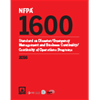industry standards
What is a standard?A standard is a document that provides requirements, specifications, guidelines or characteristics that can be used consistently to ensure that materials, products, processes and services are fit for their purpose. STANDARDSInternationalISO 22301:2012, "Societal security – Business continuity management systems – Requirements," specifies a management system to manage an organization's business continuity arrangements. It is formal in style in order to facilitate compliance auditing and certification. It is supported by ISO 22313:2012, "Societal security – Business continuity management systems – Guidance," which provides more pragmatic advice concerning business continuity management. ISO/IEC 27031:2011, "Information security – Security techniques – Guidelines for information and communication technology [ICT] readiness for business continuity" offers guidance on the ICT aspects of business continuity management. North AmericaPublished by the National Fire Protection Association NFPA 1600: Standard on Disaster/Emergency Management and Business Continuity Programs. ISO StandardsWhat are the benefits of ISO International Standards?ISO International Standards ensure that products and services are safe, reliable and of good quality. For business, they are strategic tools that reduce costs by minimizing waste and errors and increasing productivity. They help companies to access new markets, level the playing field for developing countries, and facilitate free and fair global trade. ISO 22301:2012ISO 22301:2012 specifies requirements to plan, establish, implement, operate, monitor, review, maintain and continually improve a documented management system to protect against, reduce the likelihood of occurrence, prepare for, respond to and recover from disruptive incidents when they arise. The requirements specified in ISO 22301:2012 are generic and intended to be applicable to all organizations, or parts thereof, regardless of type, size and nature of the organization. The extent of application of these requirements depends on the organization's operating environment and complexity. North America: NFPA 1600What is NFPA 1600?The National Commission on Terrorist Attacks Upon the United States (the 9/11 Commission), recognized NFPA 1600 as our National Preparedness Standard. Widely used by public, not-for-profit, nongovernmental and private entities on a local, regional, national, international and global basis, NFPA 1600 has been adopted by the U.S. Department of Homeland Security as a voluntary consensus standard for emergency preparedness. 
What does NFPA address?Provisions cover the development, implementation, assessment and maintenance of programs for prevention, mitigation, preparedness, response, continuity and recovery. Click image to purchase. |
